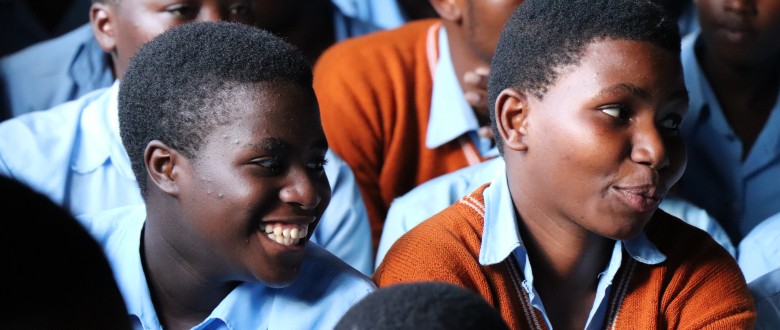
On 20 November, we celebrate the 29th anniversary of the Convention on the Rights of the Child. But the road to fulfilling article 29 – on the right to quality education – is proving a long one, as VVOB General Director Sven Rooms explains.
1 teacher - 70 learners
“Every child from our community goes to school here”, the principal of a rural school near Lake Victoria in Kenya beamingly told me a while back. Something to be proud of indeed, because just a few years prior only half of the community’s children was enrolled. But then I took a closer look: I was standing in a room with one teacher in front of more than 70 learners. Through the open window a handful of other children was trying to follow the class’ lessons.
Being in school does not equal the enjoyment of quality education. In other words: the struggle for the right to education does not end with access to education alone.
Moral milestone
On 20 November we celebrate the 29th anniversary of the International Convention on the Rights of the Child. Not your typical treaty: save the United States, every UN member state has ratified this human rights convention. The Rights of the Child are a globally shared moral milestone.
The right to education is one of the key elements of the treaty. Not just the right to access to education (art. 28) but also and more importantly the right to quality education (art. 29) must be put into practice if children and youngsters are to develop to their full potential in our changing world. The 196 countries who ratified the convention thus committed, among other things, to respect, protect and fulfil the right to quality education.
Learning crisis
Since ratifying the convention, countries around the world have taken commendable steps to getting more children in school. But what used to be an ‘access crisis’ has gradually evolved into a ‘learning crisis’. The Kenyan school is only an example of a global reality I am confronted with daily in my job. Yes, more children than ever before are in school, but that does not mean all of them are also learning. In primary education alone, 274 million learners lack basic skills.
This learning crisis seriously endangers our children’s futures, but also that of developing societies. The learning crisis reinforces the transmission of intergenerational poverty.
Crucial cocktail
There is no school-related factor that has as big an effect on the learning outcomes of learners as The Teacher. Their professional quality and effectiveness is the most important ingredient of good education, as is that of The School Leader. The latter has an impact on the performance of her/his teachers that should not be understated, international research has repeatedly shown.
For this reason, the professional development (both pre- and in-service) of these crucial actors is the crux of VVOB’s work.
But let me state clearly from the start: teachers and school leaders are not to be blamed as the sole cause for the under-performance of learners – too often they are unjustly accused of this. Teachers are often the victim of a very limited education system that does not take into account their needs. Without quality teacher training for students, without sound mentoring for new teachers during their first years in the profession, without opportunities for professional development for experienced teachers, without a strong educational context… teachers are left to face an impossible task. And yet we place this huge responsibility on their shoulders.
Governments as priority partners
VVOB looks to governments in the first place to face the learning crisis head-on. Ultimately, providing quality and effective education is their responsibility, which they attested to in part by putting their signature under the Convention on the Rights of the Child.
This is not an easy task, especially for governments who are confronted with multiple structural barriers that prevent them from fulfilling the right to quality education for every child.
VVOB’s strategy is to develop the capacity of the governments in our eight partner countries. The ministry of education is always our priority partner and – by extension – their institutions are too, such as teacher training colleges and organisations charged with the professional development of teachers and school leaders.
Ours is a sustainable solution, because, in the end, governments must have the strong capacity to ensure the right to education on their own account. And that should be our common goal. If we achieve this, we will be able to properly celebrate the anniversary of the Convention on the Rights of the Child.




